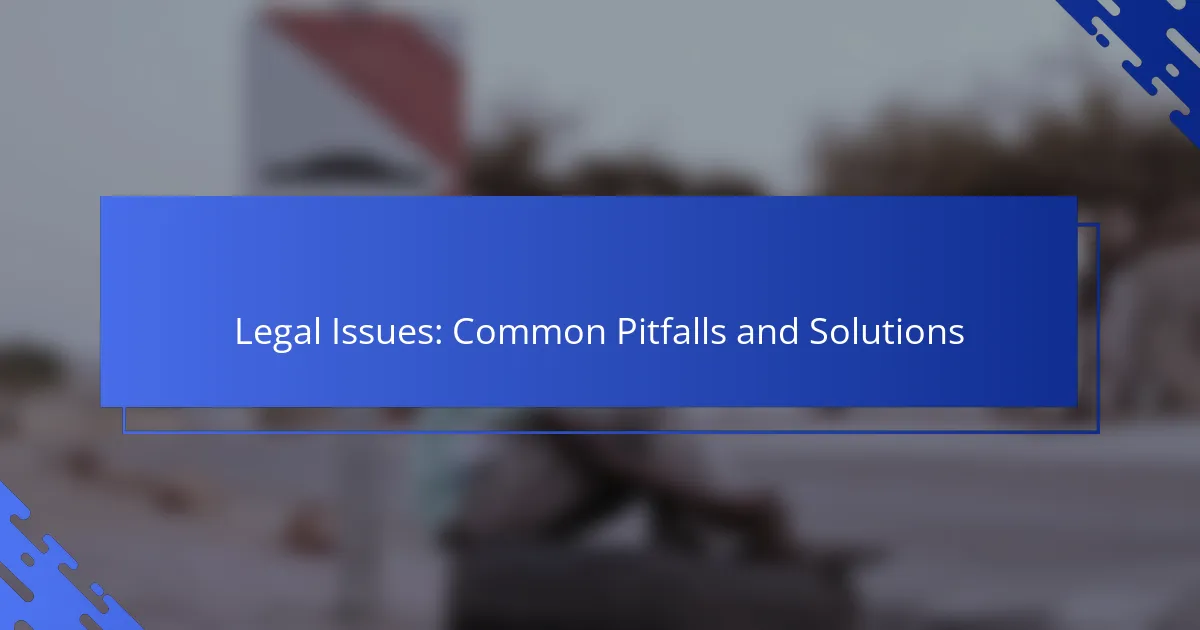Understanding common legal issues is crucial for businesses to thrive and avoid costly pitfalls. From contract disputes to data privacy breaches, proactive measures such as clear protocols and expert consultations can significantly mitigate risks. By implementing effective compliance strategies and maintaining regular audits, companies can safeguard their interests and ensure adherence to relevant laws and regulations.

What Are Common Legal Issues in Business?
Common legal issues in business include contract disputes, intellectual property infringement, employment law violations, regulatory compliance failures, and data privacy breaches. Addressing these challenges proactively can help mitigate risks and protect a company’s interests.
Contract disputes
Contract disputes arise when parties disagree on the terms or execution of an agreement. These conflicts can lead to costly litigation or damage relationships, making it essential to have clear, well-drafted contracts.
To prevent disputes, ensure all parties understand their obligations and include dispute resolution clauses. Regularly reviewing contracts can also help identify potential issues before they escalate.
Intellectual property infringement
Intellectual property infringement occurs when someone uses protected ideas, inventions, or branding without permission. This can lead to significant financial losses and damage to reputation.
Businesses should register their intellectual property and monitor for unauthorized use. Implementing strong internal policies for protecting IP can also help minimize risks.
Employment law violations
Employment law violations involve breaches of labor regulations, such as wage and hour laws, workplace safety, and anti-discrimination statutes. Non-compliance can result in legal penalties and employee dissatisfaction.
To avoid violations, stay informed about local labor laws and regularly audit workplace practices. Providing training for management on legal obligations can also foster a compliant work environment.
Regulatory compliance failures
Regulatory compliance failures happen when a business does not adhere to industry-specific laws and regulations. This can lead to fines, legal action, and reputational damage.
Establishing a compliance program that includes regular training and audits can help ensure adherence to regulations. Keeping abreast of changes in laws relevant to your industry is crucial for ongoing compliance.
Data privacy breaches
Data privacy breaches occur when sensitive information is accessed or disclosed without authorization. With increasing regulations like GDPR and CCPA, businesses face serious consequences for non-compliance.
To protect against breaches, implement robust cybersecurity measures and conduct regular risk assessments. Educating employees about data protection practices is also vital in safeguarding sensitive information.

How Can Businesses Avoid Legal Pitfalls?
Businesses can avoid legal pitfalls by establishing clear protocols, maintaining compliance, and seeking expert advice. Proactive measures such as drafting precise contracts and conducting regular audits can significantly reduce the risk of legal issues.
Implementing clear contracts
Clear contracts are essential for defining the rights and responsibilities of all parties involved in a business transaction. They should be detailed, outlining terms, conditions, and expectations to prevent misunderstandings. Consider including clauses for dispute resolution and termination to safeguard your interests.
When drafting contracts, use plain language and avoid legal jargon to ensure all parties understand the terms. Regularly review and update contracts to reflect changes in laws or business practices.
Regular legal audits
Conducting regular legal audits helps identify potential compliance issues before they escalate into significant problems. These audits should assess adherence to applicable laws, regulations, and internal policies. Aim to perform these audits at least annually or whenever there are substantial changes in business operations.
During an audit, focus on areas such as employment practices, data protection, and contractual obligations. Document findings and create an action plan to address any identified weaknesses.
Employee training programs
Implementing employee training programs on legal compliance is crucial for minimizing risks. These programs should cover relevant laws, company policies, and ethical standards. Regular training sessions can help employees recognize potential legal issues and understand their responsibilities.
Consider using a mix of in-person workshops and online courses to accommodate different learning styles. Evaluate the effectiveness of training through assessments and feedback to ensure continuous improvement.
Consulting legal experts
Consulting legal experts is vital for navigating complex legal landscapes. Attorneys can provide tailored advice on compliance, contracts, and risk management strategies. Establish a relationship with a legal advisor who understands your industry and can offer ongoing support.
When selecting a legal expert, look for someone with relevant experience and a track record of success. Regular consultations can help you stay informed about changes in laws that may impact your business operations.

What Are Effective Legal Compliance Strategies?
Effective legal compliance strategies involve systematic approaches to ensure adherence to laws and regulations relevant to a business. These strategies help mitigate risks and avoid penalties by establishing clear guidelines and processes.
Establishing compliance checklists
Creating compliance checklists is a practical method to ensure that all legal requirements are met. These checklists should cover essential regulations specific to your industry, such as data protection laws, labor regulations, and environmental standards.
Regularly updating these checklists is crucial, as laws can change frequently. A good practice is to review them quarterly and adjust based on any new legislation or regulatory guidance.
Utilizing legal management software
Legal management software streamlines compliance processes by automating tasks such as document management, deadline tracking, and reporting. This technology can significantly reduce the risk of human error and ensure that compliance activities are documented properly.
When selecting software, consider features like user-friendliness, integration capabilities with existing systems, and customer support. Many solutions offer tiered pricing, so evaluate options based on your organization’s size and specific needs.
Engaging with compliance consultants
Hiring compliance consultants can provide expert guidance tailored to your business’s unique legal landscape. These professionals can help identify potential compliance gaps and recommend best practices to address them effectively.
When working with consultants, ensure they have relevant experience in your industry and understand the specific regulations that apply. Establish clear goals and timelines for their engagement to maximize the benefits of their expertise.

What Are the Consequences of Ignoring Legal Issues?
Ignoring legal issues can lead to serious repercussions, including financial losses, damage to reputation, and potential legal action. Businesses and individuals who overlook these matters often find themselves facing escalating problems that could have been avoided with timely attention.
Financial penalties
Failing to address legal issues can result in significant financial penalties. These may include fines imposed by regulatory bodies, which can range from hundreds to thousands of dollars depending on the severity of the violation. For businesses, non-compliance with laws such as labor regulations or environmental standards can lead to costly settlements or increased insurance premiums.
To mitigate financial risks, it is crucial to regularly review compliance with applicable laws and regulations. Establishing a budget for legal consultations can also help in identifying potential issues before they escalate into costly penalties.
Reputation damage
Ignoring legal issues can severely damage an individual’s or a company’s reputation. Negative publicity from lawsuits or regulatory actions can lead to a loss of customer trust and loyalty. In today’s digital age, news of legal troubles can spread quickly, impacting public perception and future business opportunities.
To protect reputation, proactive communication and transparency are essential. Addressing legal concerns openly and demonstrating a commitment to compliance can help rebuild trust with stakeholders and the public.
Legal action and lawsuits
One of the most serious consequences of ignoring legal issues is the risk of facing lawsuits. Legal action can arise from various sources, including employees, customers, or competitors, and can lead to lengthy and costly litigation. The financial burden of legal fees, settlements, and potential damages can be overwhelming.
To avoid legal action, it is advisable to maintain clear documentation of all business practices and decisions. Regular legal audits can help identify vulnerabilities and ensure that all operations comply with current laws, reducing the likelihood of disputes escalating to lawsuits.

How Do Legal Issues Differ by Industry?
Legal issues vary significantly by industry due to the specific regulations, compliance requirements, and operational risks inherent in each sector. Understanding these differences is crucial for businesses to navigate legal landscapes effectively and avoid potential pitfalls.
Healthcare regulations
Healthcare regulations are primarily focused on patient safety, data privacy, and the ethical treatment of patients. Key laws like the Health Insurance Portability and Accountability Act (HIPAA) in the U.S. set strict guidelines on handling patient information and maintaining confidentiality.
Organizations must ensure compliance with local and federal regulations, which can include licensing requirements, quality of care standards, and reporting obligations. Failing to adhere to these can lead to significant penalties, including fines and loss of licensure.
Financial services compliance
Financial services are governed by a complex framework of regulations aimed at protecting consumers and ensuring market integrity. Regulations such as the Dodd-Frank Act in the U.S. and the Markets in Financial Instruments Directive (MiFID) in Europe impose strict compliance requirements on financial institutions.
Companies must implement robust compliance programs to monitor transactions, prevent fraud, and report suspicious activities. Common pitfalls include inadequate training for employees and failure to keep up with changing regulations, which can result in hefty fines and reputational damage.
Technology and data protection laws
Technology companies face unique legal challenges, particularly regarding data protection and privacy laws. Regulations like the General Data Protection Regulation (GDPR) in Europe impose strict rules on how personal data is collected, processed, and stored.
Businesses must adopt comprehensive data protection strategies, including obtaining user consent and ensuring data security. A common mistake is underestimating the importance of compliance, which can lead to significant fines and loss of customer trust. Regular audits and employee training are essential to mitigate risks in this area.
